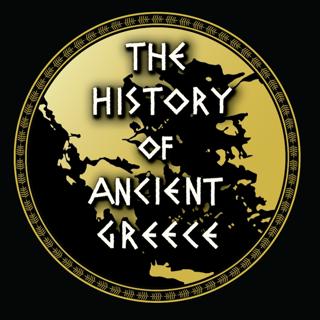
017 Archaic Art and Architecture
In this episode, we discuss the innovation taking place during the 7th and 6th centuries BC in the realm of vase painting (Orientalizing, Korinthian, and Attic black-figure and red-figure), statuary (kouros/kore and reliefs), and architecture (Doric/Ionic temples, treasuries, and stoas) by looking at some notable works of Archaic art and architecture Show Notes: http://www.thehistoryofancientgreece.com/2016/08/017-archaic-art-and-architecture.html
25 Heinä 201649min

016 The "Age of Tyranny"
In this episode, we discuss the new political phenomena arising in various parts of the Greek world in the 7th and 6th centuries BC, called tyranny, by focusing on four poleis in the Peloponnesos in particular as case studies for its cause: Pheidon of Argos (the military cause), Kypselos and Periandros of Korinth (the economic cause), Kleisthenes of Sikyon (the ethnic cause), and Theogenes of Megara (the unsuccessful attempt) Show Notes: http://www.thehistoryofancientgreece.com/2016/07/016-age-of-tyranny.html
18 Heinä 201646min

015 Colonization and the East
In this episode, we discuss the Greek emigration northeastward into the Chalkidiki, Thrace, Hellespont, Bosporus, Black Sea, and southwards into northern Africa during the 7th and 6th centuries BC; the reigns of the Lydian and Egyptian kings of the 26th Saite Dynasty and their relations with the Greeks until around 550 BC; and the development of coinage (first in Lydia and then its widespread adoption and adaptation by the Greeks in the 6th century BC) Show Notes: http://www.thehistoryofancientgreece.com/2016/07/015-colonization-and-east.html Intro by Dominic Perry of the History of Egypt Podcast Website: https://egyptianhistorypodcast.com Facebook: https://www.facebook.com/EgyptianPodcast Twitter: https://twitter.com/EgyptianPodcast
11 Heinä 201659min

014 Colonization and the West
In this episode, we discuss the various causes of Greek colonization (population growth, shortage of land, trade opportunities, civil strife, and new adventures); the Greek emigration westward into southern Italy and Sicily, the coasts of southern France and eastern Spain, and on the islands of Corsica and Sardinia during the 8th, 7th, and 6th centuries BC; the development of the trireme by the Phoenicians/Corinthians in order to protect their maritime trade networks from roving bands of pirates looking for ships laden with exotic goods; and the growing tensions in the central and western Mediterranean Sea between the western Greeks and the Etruscans and Phoenicians (specifically the Carthaginians) until around 550 BC Show Notes: http://www.thehistoryofancientgreece.com/2016/07/014-colonization-and-west.html
4 Heinä 201649min

013 Hoplite Warfare
In this episode, we discuss the revolutionary changes in warfare that took place in the 8th and 7th centuries BC that were strictly Greek and reflect the abstract nature of the polis; the type of armor worn and weaponry employed by a typical hoplite; the organization and training of military forces; their application of tactics in a typical battle sequence; the cultic practices of the bloodlust god, Ares, who personifies the grim and horrific aspects of warfare; and the Lelantine War, the first large-scale war on the Greek record after the mythical Trojan War and the first instance in which these military changes were employed Show Notes: http://www.thehistoryofancientgreece.com/2016/07/013-hoplite-warfare.html
27 Kesä 201644min

012 Oligarchs and Hesiod
In this episode, we discuss the transitional governments in the early stages of the centrally unified polis (oligarchia and aristokratia), as the waning power of the basileis becomes supplanted by a small landowning group of nobles; the economic and social divisions between the nobles and commoners brought on by a spike in population in Greece; and the second great author of ancient Greece, a man named Hesiod, who speaks to us about life and society in the emerging polis from the point of view of the ordinary citizen, in his Works and Days Show Notes: http://www.thehistoryofancientgreece.com/2016/06/012-oligarchs-and-hesiod.html
20 Kesä 201639min

011 From Oikos to Polis
In this episode, we discuss the community (demos) and household (oikos) in the late Dark Age; their socio-political and geographical unification (through a process called synoikismos), which lead to the city-state (polis) and brought about the transition from the Dark Age into the Archaic Period; and later Greek philosophical thought on the polis and polis identity and what it meant to live in a polis beyond just its physical space Show Notes: http://www.thehistoryofancientgreece.com/2016/06/011-from-oikos-to-polis.html
13 Kesä 201643min

010 Religion and Panhellenism
In this episode, we discuss early Greek religion as it was formalized in the writings of Homer and Hesiod; the various rituals that were performed when the Greeks worshipped their deities; the evidence for the earliest sanctuaries and hero cults in the 8th century BC that developed hand-in-hand with the city-state and their increasing wealth (as seen through votive offerings); the early developments of the idea of Panhellenism (a sense of a common Greek identity); and the foundation myths, archaeological evidence, and importance for the four predominant Panhellenic sanctuaries that gained massive popularity in the 8th and 7th centuries BC (Zeus and Hera at Olympia, Apollo and Artemis at Delos, Apollo at Delphi, and Zeus and Dione at Dodona—with the latter two having popular oracular shrines) Show Notes: http://www.thehistoryofancientgreece.com/2016/06/010-panhellenism.html
6 Kesä 201645min





















